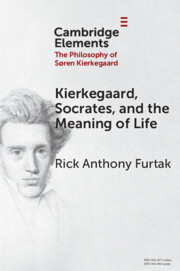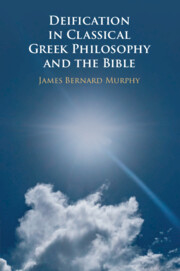Refine search
Actions for selected content:
145 results
Chapter 1 - Introduction
-
- Book:
- Family, Vocation, and Humanism in the Italian Renaissance
- Print publication:
- 29 January 2026, pp 1-17
-
- Chapter
- Export citation
Chapter 9 - Oracles and Divination
- from Part II - Beliefs and Practices
-
-
- Book:
- Personal Religion in the Ancient Greek World
- Published online:
- 25 November 2025
- Print publication:
- 11 December 2025, pp 211-231
-
- Chapter
- Export citation
Chapter 19 - Plato
- from Part III - Individuals
-
-
- Book:
- Personal Religion in the Ancient Greek World
- Published online:
- 25 November 2025
- Print publication:
- 11 December 2025, pp 428-451
-
- Chapter
- Export citation
Philosophy as a Way of Life: Between Theory and Transformation
-
- Journal:
- Dialogue: Canadian Philosophical Review / Revue canadienne de philosophie , First View
- Published online by Cambridge University Press:
- 20 October 2025, pp. 1-12
-
- Article
- Export citation
5 - Episodes in Rival Narratives
-
- Book:
- The Narrative Conflict of Traditions in the Late Antique World
- Published online:
- 22 September 2025
- Print publication:
- 09 October 2025, pp 158-197
-
- Chapter
- Export citation
Chapter 2 - Duties and Permissible Actions in the Early Stoics and Kant
- from Part I - Law and ‘Duty’
-
-
- Book:
- Kant and Stoic Ethics
- Published online:
- 18 July 2025
- Print publication:
- 07 August 2025, pp 31-48
-
- Chapter
- Export citation
Chapter 5 - Perfection and Morality
- from Part II - Virtue and Eudaimonia
-
-
- Book:
- Kant and Stoic Ethics
- Published online:
- 18 July 2025
- Print publication:
- 07 August 2025, pp 88-104
-
- Chapter
- Export citation
Chapter 3 - A Complex Model of Action: What Is Ruling?
- from Part II - Motivational Challenges to Self-Rule
-
-
- Book:
- Platonic Autonomy
- Published online:
- 07 August 2025
- Print publication:
- 31 July 2025, pp 58-80
-
- Chapter
- Export citation
Chapter 5 - Socrates and Conflicting Epistemic Requirements
- from Part III - Internal and External Authorities
-
-
- Book:
- Platonic Autonomy
- Published online:
- 07 August 2025
- Print publication:
- 31 July 2025, pp 106-127
-
- Chapter
- Export citation
SOCRATES THE GADFLY: A RESPONSE TO MARSHALL AND THE CAMBRIDGE GREEK LEXICON
-
- Journal:
- The Classical Quarterly , First View
- Published online by Cambridge University Press:
- 02 June 2025, pp. 1-12
-
- Article
-
- You have access
- Open access
- HTML
- Export citation

Kierkegaard, Socrates, and the Meaning of Life
-
- Published online:
- 20 March 2025
- Print publication:
- 17 April 2025
-
- Element
- Export citation
Chapter 4 - Socrates and the Voices of Neutrality
-
- Book:
- Athens, 403 BC
- Published online:
- 28 February 2025
- Print publication:
- 20 March 2025, pp 138-165
-
- Chapter
- Export citation
SOCRATES AND THE SEVEN SAGES
-
- Journal:
- The Classical Quarterly / Volume 74 / Issue 2 / December 2024
- Published online by Cambridge University Press:
- 16 May 2025, pp. 469-484
- Print publication:
- December 2024
-
- Article
-
- You have access
- Open access
- HTML
- Export citation

Deification in Classical Greek Philosophy and the Bible
-
- Published online:
- 10 July 2024
- Print publication:
- 27 June 2024
1 - Ancient Influences on the Essay
- from Part I - Forming the British Essay
-
-
- Book:
- The Cambridge History of the British Essay
- Published online:
- 31 October 2024
- Print publication:
- 04 July 2024, pp 3-17
-
- Chapter
- Export citation
Chapter 6 - Democracy as a Universal Good
-
- Book:
- Democracy, Theatre and Performance
- Published online:
- 17 May 2024
- Print publication:
- 27 June 2024, pp 145-168
-
- Chapter
- Export citation
Chapter 3 - Ironic Deification in Socrates
-
- Book:
- Deification in Classical Greek Philosophy and the Bible
- Published online:
- 10 July 2024
- Print publication:
- 27 June 2024, pp 99-128
-
- Chapter
- Export citation
8 - Conclusion
-
- Book:
- Helping Friends and Harming Enemies
- Published online:
- 06 June 2024
- Print publication:
- 13 June 2024, pp 260-273
-
- Chapter
- Export citation
Chapter 5 - The Ethical Function of the Gorgias’ Concluding Myth
-
-
- Book:
- Plato's Gorgias
- Published online:
- 25 May 2024
- Print publication:
- 30 May 2024, pp 87-104
-
- Chapter
- Export citation
Chapter 3 - Philosophy and the Just Life in the Gorgias
-
-
- Book:
- Plato's Gorgias
- Published online:
- 25 May 2024
- Print publication:
- 30 May 2024, pp 48-67
-
- Chapter
- Export citation
